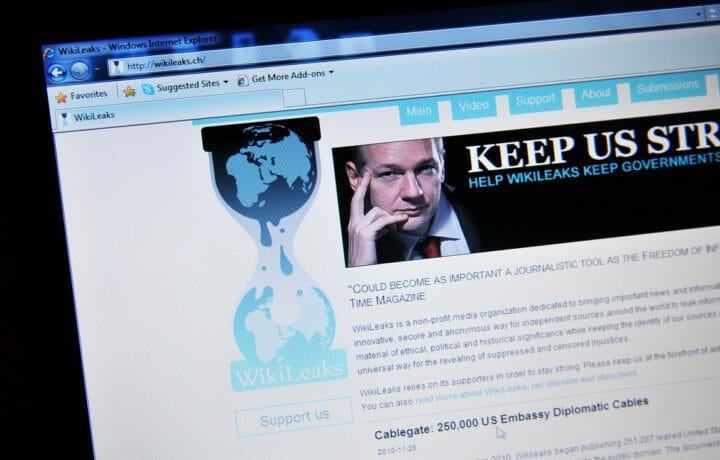Wikileaks founder Julian Assange is in British custody after living in secluded asylum for the more than six years. It’s not a minute too soon. It’s long overdue, if you ask me.
The staff at the Ecuadorian embassy in London finally grew weary of the world’s worst houseguest—and his cat. Like your college friend who stays too long, never cleans up after himself, raids the fridge, and doesn’t give you any money for beer, Ecuador has given Assange the heave-ho.
Not a journalist
When Assange left the embassy, British authorities greeted him immediately. At the same time, the U.S. government unsealed an indictment it secured a year ago, and had alluded to in a separate indictment related to the Mueller investigation into Russian meddling in the 2016 election. But the charge is not directly related to the publication of the documents purloined by convicted leaker Chelsea (née Bradley) Manning or those stolen from the email servers of the Democratic National Committee and Hillary Clinton campaign.
Wisely, the government has not charged Assange with espionage. Since the rise of the internet, and particularly blogging, the question of who does and who does not qualify as a “journalist” has been hotly debated. My own sense is that Assange is not a journalist; he’s just a guy who purchased a URL and published a bunch of stolen classified or personal documents without any context or analysis.
Instead, the government alleges that Assange conspired with Manning to bypass security protocols in the Secret Internet Protocol Router Network, better known as SIPRNet, or just SIPR. “On or about March 8, 2010,” the government alleges, “Assange agreed to assist Manning in cracking a password stored on Department of Defense computers connected to the [SIPRNet]…” The indictment does state that “cracking the password would have allowed Manning to log onto the computers under a username that did not belong to her.” [emphasis added]
“Would have” implies that Assange was unable to crack the “hash value” password. But unfortunately for him, conspiracy doesn’t require a successful hack.
“A Centre for Spying”
Predictably, Assange-friendly outlets like The Intercept rose to Assange’s defense. Glenn Greenwald and Micah Lee wrote last week that Assange was merely “trying to help Manning log into the Defense Department’s computers using a different username so that she could maintain her anonymity while downloading documents in the public interest and then furnish them to WikiLeaks to publish.”
Hogwash.
As maddening as it might be, journalists—legitimate ones anyway—have a right to publish classified information people send to them. That much was established during the Pentagon Papers trials in 1971. Daniel Ellsberg, the Pentagon contractor who leaked the documents, faced punishment, but the New York Times and Washington Post, the papers that published them, did not.
But journalists do not have the right to assist their sources in bypassing security to steal documents. In 1971, the Times and the Post weren’t telling Ellsberg how to smuggle the Pentagon Papers to them.
Furthermore, they took the time to redact information to protect sources, and to ensure that current operations weren’t endangered. Assange did no such thing. He simply turned on the firehose and sprayed the internet with raw, unfiltered data. While no one has pointed directly to a source who died because of the leak, there were many nervous nights in the State Department as employees tried to figure out who was included in the leaked cables, and therefore might be in danger of being rounded up by angered authoritarian regimes around the world.
Assange can call himself whatever he wants. But Ecuadorian President Lenín Moreno was blunt. Speaking to British newspaper The Guardian, Moreno said, “We can not allow our house, the house that opened its doors, to become a centre for spying.” Even while living under Ecuador’s protection, Assange was keeping up his old tricks.
And he started biting the hand that was feeding him. “Assange’s attitude was absolutely reprehensible and outrageous after all the protection provided by the Ecuadorian state for almost seven years,” Moreno told The Guardian. “He mistreated our officials…[and] abused the patience of Ecuadorians. He developed an aggressive campaign against Ecuador and started to make legal threats even against who was helping him.”
What a great guy. I hope he enjoys his prison stay.



